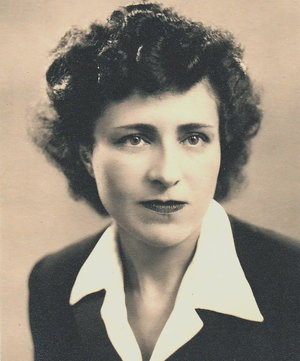
Veronique Chkheidze (familiarly called Lialia or Lala) was born in Petrograd on May 19, 1909 to
Alexandra Taganova (X-1943) and Nikoloz Chkheidze (known as Karlo) member of the Duma
(representing Georgia), and has two older sisters, Nata and Lidusi, and a brother, Stanislav. She
shares her childhood between the capital of the tsarist empire, Tiflis and Pouti, a small village in
Imereti where her father's aristocratic family had ties.
She has a bad memory of the period of 1917. In April, her brother is killed by handling a firearm.
Everything is lacking in Petrograd and life is difficult for families, not only for daily supplies, but also
for street protests. She sees very little of her father (Chairman of the Executive Committee of the
Soviet from February to October), who spends his time in political meetings and harangues
protesters pushed by the Bolsheviks.
From November 1917 to January 1919, she joins Tiflis and found a more favorable climate, especially
for her studies. Yet his father is again very busy: the disputes between Armenians, Azeris and
Georgian nationalists invade the Transcaucasian space and sometimes also the family life at random
guests.
In January 1919, she leaves with her parents in Paris (her father, president of the National Council of
Georgia, is sent to represent Georgia at the Peace Conference). She discovered, at 10 years, not only
Paris, but Versailles, London and Rome where the diplomatic missions lead his father.
Then she returns to Tiflis for about twenty months. In front of the advance of the Red Army on the
Georgian territory, she embarked with her parents on March 17, 1921 in Batumi, aboard a boat
towards Constantinople, leaving her two sisters.
From the summer of 1922, she lives at the Georgian House in Leuville-sur-Orge (25 kilometers from
Paris): she rediscovers France and studies in a private pension near the town of Montlhery. She is
friend with other young Georgians, Mariam Barnovi (who will become Melua's wife), Tamara
Kakheladze (who will become Takaichvili’wife) and Victor Homerikii (son of the former Minister of
Agriculture). She knows a few years of adaptation and learns to master the French language, just as
she masters the Russian language. She is upset when her friend Viktor (familiarly called Vitia)
discovers on June 7, 1926 that his father slit his throat with a razor (Karlo, transported to Paris, dies a
few days later).
She leaves to live in Paris with her mother Alexandra and knows particularly difficult living conditions:
only the help of the Eligulashvili family allows them to subsist. She will never come back to the
Georgian House of Leuville-sur-Orge. Her adult life will be far from Georgian emigration.
Veronique starts working as a secretary and learns accounting. She will do her work in several
companies, textile activities, import / export activities (caviar for example).
In the 1930s she married with Anatole de Grassmann (1901-1962), of Baltic origin, former cadet of
the Russian army of Nicholas II: he was a taxi driver, then the Andre Citroen’s driver (a French
manufacturer) and a driver in the company Citroen in the 1950s. They live in Paris, 23 rue Benard,
with Alexandra, and have no children.
In the late 1940s and during the 1950s, they used to vacation in Saint-Germain-les-Arpajon, a village
at a few kilometers from Leuville-sur-Orge, in a Georgian family. Colonel Simon Tsereteli (1870-
1951), his godfather of Orthodox religion, friend of Karlo Chkheidze, meets her once a year. She
becomes the godmother of the children of the family, Luka, Mirian and Elen; Orthodox baptism is
celebrated by the Georgian father Nicholas Zabakhidze; the celebration (“supra”) is chaired
(“tamada”) by Irakli Tsereteli (1881-1959), former Russian and Georgian minister, who remained
close to her before leaving for the United States.
In 1962, after the death of her husband Anatole de Grassmann, she decided to buy a funeral
concession in the Georgian square of the French Cemetery of Leuville-sur-Orge, for him and for her,
wishing to maintain the graves of his parents in the Pere Lachaise cemetery in Paris, given the
historical dimension of his father.
She has a fragile health and falls ill in the early 1980s. Veronique asks not to see anyone and dies in a
hospital in Paris, at 54-56 Pascal Street, July 2, 1986. She is buried alongside her husband Anatole de
Grassmann.













